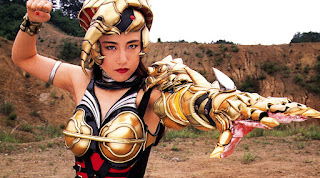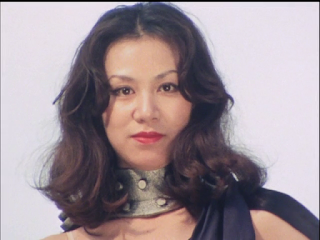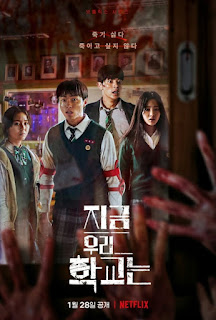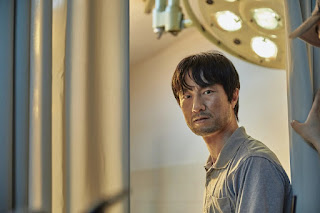Woman in Witness Protection; or, See no Evil, Hear no Evil
It’s fine. It’s called acting.
The late director Juzo Itami always crafted his movies around the topical concerns which troubled society, and Woman in Witness Protection is no exception. This time, the main heroine (as always played by Itami’s wife, Nobuko Miyamoto) finds herself on the run from a vicious cult. As a matter of fact, Itami focused on the issue of religious cults as early as 1988 in A Taxing Woman’s Return, where an IRS agent investigates an insidious religious group that is suspected of tax evasion.
It’s fine. It’s called acting.
The late director Juzo Itami always crafted his movies around the topical concerns which troubled society, and Woman in Witness Protection is no exception. This time, the main heroine (as always played by Itami’s wife, Nobuko Miyamoto) finds herself on the run from a vicious cult. As a matter of fact, Itami focused on the issue of religious cults as early as 1988 in A Taxing Woman’s Return, where an IRS agent investigates an insidious religious group that is suspected of tax evasion.
Release Info
Directed by: Juzo Itami Starring: Nobuko Miyamoto, Masahiko Nishimura, Takehiro Murata
Language: Japanese Original Title: マルタイの女 Runtime: 131 min
Synopsis
In Woman in Witness Protection, we follow Biwako Isono (Nobuko Miyamoto), a shallow and spoiled movie star. All of a sudden, she witnesses a gruesome murder of an anti-cult lawyer and his wife. In order to protect the actress from religious fanatics, the police provide her with specially trained witness protection officers until the trial. In the meantime, Biwako has to deal with various means of harassment and attempts to tarnish her public image.
In Woman in Witness Protection, we follow Biwako Isono (Nobuko Miyamoto), a shallow and spoiled movie star. All of a sudden, she witnesses a gruesome murder of an anti-cult lawyer and his wife. In order to protect the actress from religious fanatics, the police provide her with specially trained witness protection officers until the trial. In the meantime, Biwako has to deal with various means of harassment and attempts to tarnish her public image.
All the World’s a Stage
To put it in simple terms, Woman in Witness Protection is Juzo Itami’s middle finger towards Aum Shinrikyo. By means of his usual black comedy style and brutal satire, the director exposes the fallacies of the cult and how it engages in domestic terrorism. The premise of the story is actually based on the real-life murder of Tsutsumi Sakamoto and his family. In addition, Itami can’t help himself but name Aum and Asahara in one of the interrogation scenes when police officers try to disprove the might of the glorious “Guru” by stating that he actually can’t levitate.
To put it in simple terms, Woman in Witness Protection is Juzo Itami’s middle finger towards Aum Shinrikyo. By means of his usual black comedy style and brutal satire, the director exposes the fallacies of the cult and how it engages in domestic terrorism. The premise of the story is actually based on the real-life murder of Tsutsumi Sakamoto and his family. In addition, Itami can’t help himself but name Aum and Asahara in one of the interrogation scenes when police officers try to disprove the might of the glorious “Guru” by stating that he actually can’t levitate.
The movie is divided into appropriate sections (the murder, the investigation, the arrest, etc.) in order to present the sequence of events and how the law enforcement works. In the midst of all that we have Biwako Isono who is not entirely sure how she should behave as a witness, yet she has to maintain her acting profession while the cult is targeting her.
I believe that the closest equivalent of Woman in Witness Protection is Itami's Minbo (1992). That is, both films tackle controversial topics and have huge shifts in tone (comedic scenes are crosscut with dead serious sequences).
With regard to performances, Nobuko Miyamoto aces it once again by playing a highly energetic, outspoken, yet complex heroine. Words of appreciation also go to Masahiko Nishimura and Takehiro Murata as policemen protecting Nobuko’s character from numerous dangers. In addition, Masahiko Tsukgawa, another Itami’s regular, has a small but interesting role of Biwako’s love interest.
Recommendations
All in all, Woman in Witness Protection is a very clever comedy drama, but this is not to say that the film is free from ghastly sequences. In a Tarantino-like manner, Itami underlines the fact that nothing will stop religious fanatics from accomplishing their goals (even if it means threatening, bribery, or killing). It is quite a shame that this was the director's last movie before his untimely demise.
All in all, Woman in Witness Protection is a very clever comedy drama, but this is not to say that the film is free from ghastly sequences. In a Tarantino-like manner, Itami underlines the fact that nothing will stop religious fanatics from accomplishing their goals (even if it means threatening, bribery, or killing). It is quite a shame that this was the director's last movie before his untimely demise.
«Enjoyed this post? Never miss out on future posts by following us»








































